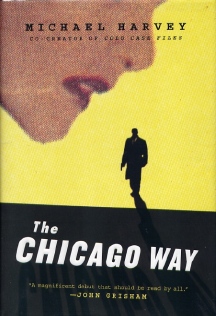Some novels don’t simply have characters – they are characters,
as a whole. This is certainly true for 'The Chicago Way', which ambles
up the reader like a big irresistibly friendly dog – simple, stylish
and fun. You look this book in the eye, and you can't help but like it.
In fact, 'The Chicago Way' is so easy to enjoy that it's easy to overlook
the craft that goes into its creation. The crystal-clear characters,
the crisply-described action and the flavor of the titular setting blend
effortlessly to submerge readers in a world not their own. Hopefully.
For all the friendliness of the novel itself, the world of Michael Kelly,
an ex-cop and Chicago PI, is a perfect pitch-black noir. People die.
It doesn't seem a likely when we first met Kelly, sitting feet up with
a cup of Earl Grey contemplating the Cubs. But that idyll is quickly
soured when Kelly's former partner, John Gibbons, still a cop, shows
up. He's looking into an unsolved rape, a cold case that he worked some
eight years ago. Gibbons is quickly killed and Kelly is put in the picture.
When Gibbons' client shows up to hire Kelly, he's already motivated to
find out what got his friend killed. The fact that said client is a battered
blonde is icing on the cake.
The appeal of Harvey's stripped-down prose is instantly engaging. I was
reminded of Charles Willeford, as well as noir icons Hammet and Chandler.
There's an almost child-like simplicity to Harvey's writing, which extends
to his treatment of more adult subject matter as well. This is to say
that though 'The Chicago Way' has a veneer of forensic crime fiction,
and deals in serious matters such as the complex nature of rape, it never
lingers beyond the necessary. Harvey's easy-to-read style is easy to
read in part because he knows when to elide detail and when to include
it. One of the great joys of this novel is Harvey's circumspection, his
willingness to let remain stoically silent in the face of life's most
ugly moments. That silence may or may not speak volumes, but it surely
makes 'The Chicago Way' enjoyable without being either lightweight or
gruesome.
The small cadre of characters in 'The Chicago Way' is another important
aspect of the novel's appeal. Michael Kelly is familiar enough to be
quickly understood but quirky enough to stay in your memory. A fondness
for the classical languages helps. You like Michael Kelly; he's a pretty
straightforward stand-up guy, not too full of himself and not overly
wrapped in the noir dress and behavior code. His cohorts are equally
appealing, particularly Nicole Andrews, a childhood friend who is now
a DNA expert. Hers and Kelly's back story informs the novel, and nicely
dovetails with other plot points. Diane Lindsay is the TV reporter you
might see every night on your local eleven o'clock news, nicely written
to be just a bit tarter than you might expect. I was especially fond
of Vince Rodriguez, a detective assigned to the case who doesn't enjoy
his plot arc as much as readers will. What've most enjoyable overall
is how well-defined each and every character is. This is a book that
will satisfy your inner neatnik with characters scrubbed as clean as
the prose.
But there is always an exception, and in this case the character that
is not neat is the setting itself, the city of Chicago. Harvey uses his
intimate knowledge of the city put the reader is a number of real places,
including the coffee shop where he wrote portions of the novel and the
bar he himself owns. I must admit that heretofore, I've never really
cottoned to Chicago. It's always seemed both uninteresting and unduly
unpleasant. But Harvey's travelogue writing makes even the downtrodden
areas seem captivating, and I found myself wanting to eat at the restaurants
that Kelly frequents. Alas, there is no Mr. Beef franchise here in California.
If there are any weaknesses in 'The Chicago Way', they stem from the
plot. Harvey does a fine job, to be sure, and the twists are pretty twisty,
but compared to the level of skill displayed in the writing, what transpires
has a hard act to follow. I suspect a fair number of readers (not me,
to be perfectly honest) will see what happens from a decent distance.
On the other hand, when Harvey threads his plot and characters together
more closely, as he does with Kelly and Rodriguez, the results are extremely
rewarding. The relationship that they develop is one of the highlights
of the novel, nicely handled and craftily planned.
There are some important themes that get just the right amount of airtime
'The Chicago Way'. But they don’t get in the way of a good story.
Michael Kelly, er Harvey – you can't help but blur the two a bit – is,
in the final analysis, a skilled writer with great instincts. He's still
a bit rough 'round the edges, and all in all, readers are going to like
that a lot. He's not perfect, but then neither are you. Harvey is wise
enough to use that affinity in his novel, to keep it simple and clear,
like a punch in the nose. And the broken nose that results? It looks
pretty damn good after all. Friendly, like a big happy dog.
